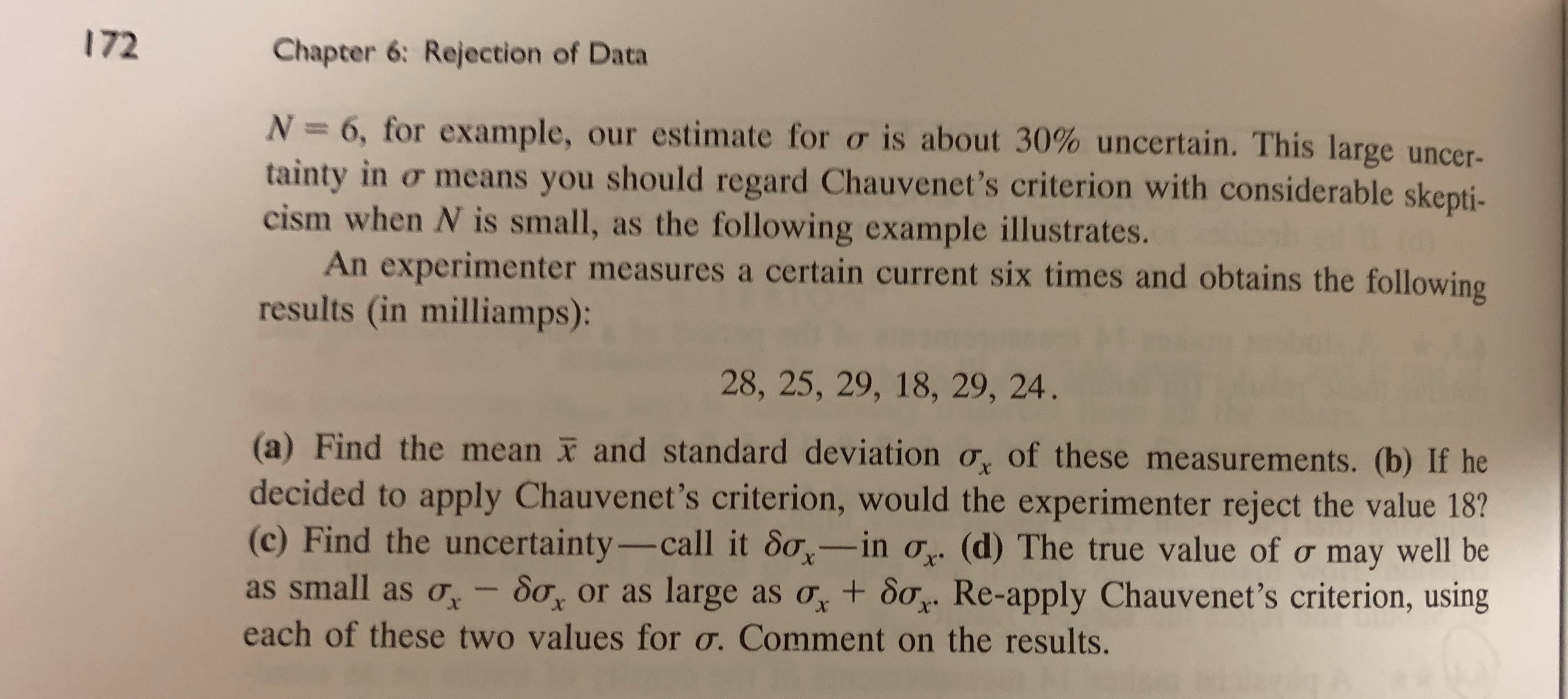6.7. Based on N measurements of a normally distributed quantity x, the best estimate of the width o is the standard deviation o, of the N measured values. Unfortunately, if N is small, this estimate is fairly uncertain. Specifically, the frac- tional uncertainty in o as an estimate of o is given by (5.46) as 1/2(N 1). If X X 172 Chapter 6: Rejection of Data N 6, for example, our estimate for o is about 30% uncertain. This large uncer- tainty in or means you should regard Chauvenet's criterion with considerable skepti- cism when N is small, as the following example illustrates. An experimenter measures a certain current six times and obtains the following results (in milliamps): 28, 25, 29, 18, 29, 24. (a) Find the mean and standard deviation o of these measurements. (b) If he decided to apply Chauvenet's criterion, would the experimenter reject the value 18? (c) Find the uncertainty- call it So-in o (d) The true value of o may well be as small as o X So or as large as oy + 8oy Re-apply Chauvenet's criterion, using X X each of these two values for o. Comment on the results.
6.7. Based on N measurements of a normally distributed quantity x, the best estimate of the width o is the standard deviation o, of the N measured values. Unfortunately, if N is small, this estimate is fairly uncertain. Specifically, the frac- tional uncertainty in o as an estimate of o is given by (5.46) as 1/2(N 1). If X X 172 Chapter 6: Rejection of Data N 6, for example, our estimate for o is about 30% uncertain. This large uncer- tainty in or means you should regard Chauvenet's criterion with considerable skepti- cism when N is small, as the following example illustrates. An experimenter measures a certain current six times and obtains the following results (in milliamps): 28, 25, 29, 18, 29, 24. (a) Find the mean and standard deviation o of these measurements. (b) If he decided to apply Chauvenet's criterion, would the experimenter reject the value 18? (c) Find the uncertainty- call it So-in o (d) The true value of o may well be as small as o X So or as large as oy + 8oy Re-apply Chauvenet's criterion, using X X each of these two values for o. Comment on the results.
A First Course in Probability (10th Edition)
10th Edition
ISBN:9780134753119
Author:Sheldon Ross
Publisher:Sheldon Ross
Chapter1: Combinatorial Analysis
Section: Chapter Questions
Problem 1.1P: a. How many different 7-place license plates are possible if the first 2 places are for letters and...
Related questions
Question

Transcribed Image Text:6.7. Based on N measurements of a normally distributed quantity x, the best
estimate of the width o is the standard deviation o, of the N measured values.
Unfortunately, if N is small, this estimate is fairly uncertain. Specifically, the frac-
tional uncertainty in o as an estimate of o is given by (5.46) as 1/2(N 1). If
X
X

Transcribed Image Text:172
Chapter 6: Rejection of Data
N 6, for example, our estimate for o is about 30% uncertain. This large uncer-
tainty in or means you should regard Chauvenet's criterion with considerable skepti-
cism when N is small, as the following example illustrates.
An experimenter measures a certain current six times and obtains the following
results (in milliamps):
28, 25, 29, 18, 29, 24.
(a) Find the mean and standard deviation o of these measurements. (b) If he
decided to apply Chauvenet's criterion, would the experimenter reject the value 18?
(c) Find the uncertainty- call it So-in o (d) The true value of o may well be
as small as o
X
So or as large as oy + 8oy Re-apply Chauvenet's criterion, using
X
X
each of these two values for o. Comment on the results.
Expert Solution
This question has been solved!
Explore an expertly crafted, step-by-step solution for a thorough understanding of key concepts.
This is a popular solution!
Trending now
This is a popular solution!
Step by step
Solved in 4 steps with 4 images

Recommended textbooks for you

A First Course in Probability (10th Edition)
Probability
ISBN:
9780134753119
Author:
Sheldon Ross
Publisher:
PEARSON


A First Course in Probability (10th Edition)
Probability
ISBN:
9780134753119
Author:
Sheldon Ross
Publisher:
PEARSON
